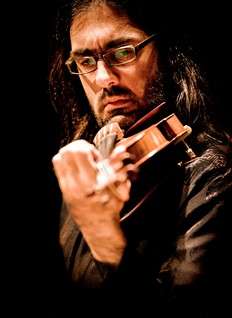|
Back
Hidden Treasures New York
David Geffen Hall, Lincoln Center
10/20/2016 - & October 21*, 22, 25, 2016
Johann Sebastian Bach: Violin Concerto in D minor (reconstructed), BWV 1052R
Ferruccio Busoni: Berceuse élégiaque
Robert Schumann: Symphony No. 2 in C major, Op. 61
New York Philharmonic, Leonidas Kavakos (violin and conductor)

L. Kavakos (© Marco Borggreve)
“That his mental state at the time was an important factor in contributing to the pathetic failure of this work is not to be gainsaid. Laborious, dull, often mediocre in thematic invention, plodding, and repetitive in argument, the C major symphony has now fallen into almost complete neglect.”
from a Schumann symposium of 1952
This week’s concert of the New York Philharmonic radiated the excitement of a presentation of a cornucopia of archeological discoveries, with each of the trio of pieces holding its own rarified fascination. Do you remember when in 1984 a musicologist purported to unearth over 30 pieces by Bach never before seen or heard? Many were skeptical and at least one wag commented that there were already more than 1000 Bach pieces in the catalogue and how many scholars actually knew them all so that therefore this discovery was a major find? Well, we have a similar situation with the first piece on this program. It is (essentially) the D minor Piano Concerto adapted for the violin. The ubiquity of the word “probably” in the program notes leaves me with some doubt as to the order of composition, but since I love the piano and orchestra concerto, I was on board to hear this fiddle endeavor.
This was a midday affair and therefore had many schoolchildren in attendance. Although they were marvelously restrained about their electronic devices, they had to applaud after each movement (not that different from an adult soiree). Leonidas Kavakos is a fine violinist, if a bit stiff. However, he is only beginning to show an aptitude for conducting, this concerto a bit by rote and unemotional. If one compares, say, one of the Edwin Fischer recordings of the piano version, there is no contest.
One of the jewels in the Philharmonic’s crown is its awareness and celebration of its own history. Busoni composed Berceuse élégiaque as a piano piece to compliment another six previously written. When he orchestrated this final poetic construction, it was given its world premiere by the Philharmonic on February 21, 1911 with Mahler conducting, becoming the last work introduced to the world before this great maestro sailed home with the score of the Symphony No 3 of Charles Ives and died. We Schoenbergians of the 1960’s loved and studied this piece and it was a treat to have it programmed in a major concert. However, this seemed more like a student performance, tentative, not very invested nor revelatory.
Although it would be comforting to think that the date of the quotation that begins this review is misprinted, it is indeed 1952 and not 1842. Schumann was pretty well ignored during the post-World War II years and had to be resurrected slowly and painstakingly. Those of us who were enamored of his bold, heart on sleeve utterances had to wait until the last quarter of the 20th century to begin to see him as acceptable, only soon to suffer the same “dead white man” status of his contemporaries. He is at present in the battle of his afterlife, hanging on as my generation passes and Schumann’s relevance is once again in doubt.
George Szell once interrupted a rehearsal of his Cleveland Orchestra to put his face right into that of a second violinist and said “Why can’t you play more relaxed!” Clearly nobody is advising this type of motivational behavior today, but Mr. Kavakos has simply not shown an ability to move the needle of his finished product so that it is more than just an acceptable approximation of the notes on the printed page. The ending of the first movement was very weak, the Scherzo lacked a sense of élan vital, and Mr. K settled for much less than enough of a swelling of his assembled strings in the Adagio espressivo. Apparently the memory of Schumann still needs shoring up and, at least at this stage of his maturation, Leonidas Kavakos is not the man to take the lead.
Fred Kirshnit
|